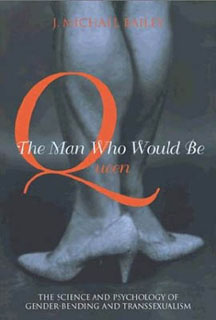|
[On line version] http://sciencenow.sciencemag.org/cgi/content/full/2003/718/2 Science Now
Transsexuality Treatise Triggers Furor Northwestern University psychologist J. Michael Bailey has stirred up a hornet's nest that is refusing to calm down. His book about male transsexuals, The Man Who Would Be Queen, has provoked furious reactions for its dismissal of an accepted theory of transsexuality. And this month, two women Bailey interviewed for the book have filed complaints with the university, claiming he did not properly inform them of their status as research subjects. The uproar began this spring after the publication of Bailey's book, much of which is based on interviews with male-to-female transsexuals he met in Chicago bars. Although the book has been praised by many, especially evolutionary psychologists, transsexuals have been up in arms, calling it "hateful" and "junk science." They object to Bailey's categorization of two types of transsexuals: homosexuals so effeminate they want to be women, and "autogynephilic" males who are erotically stimulated by seeing themselves as women. Many transsexuals regard this as demeaning and dismissive of their claim that they are women trapped in men's bodies. Bailey has many friends among transsexuals and has written letters for some recommending them for sex reassignment surgery. Nonetheless, says Stanford University neurobiologist Ben Barres, a transsexual, "This is one of the most unsympathetic portrayals of transsexuality ever written." Earlier this month, a transsexual named Anjelika Kieltyka, who had been interviewed by Bailey, complained to the university that he never told her that their conversations were part of his research. So did another woman who has remained anonymous. Northwestern says the complaints will be looked into. Academics have taken action as well. Joan Roughgarden, a transsexual biologist also at Stanford, has called on the publisher, the Joseph Henry Press--an imprint of the National Academy of Sciences--to disown the book. The editors last month issued a statement saying that reviewers found the book "a well-crafted and responsible work on a difficult topic" but acknowledging that the controversy took them by surprise. Last week, five academic transsexuals wrote a public letter to the Harry Benjamin International Gender Dysphoria Association, urging it to get involved in the cause. Bailey, who had been talking freely to the press, has now clammed up on the advice of a lawyer. Last month, however, he told the Chronicle of Higher Education that he is "very pro-gay," but "I can't be a slave to sensitivity." --CONSTANCE HOLDEN Related sites
Science
Transsexuals Up in Arms Over "Queen" Book The controversy over a new book by a Northwestern University psychologist on male transsexuals has spread to the author's home institution and the scientific body that published the book. On 3 July one of the book's sources, a transsexual named Anjelika Kieltyka, complained to university officials that author J. Michael Bailey had not properly informed her of her status as a research subject. A second subject reportedly filed a complaint last week. Joan Roughgarden, a transsexual biologist at Stanford University, has asked the Joseph Henry Press, an imprint of the National Academy of Sciences, to disown the book. And last week a protest was staged at the annual meeting of the International Academy of Sex Research in Indiana. The uproar began this spring with the publication of The Man Who Would Be Queen , much of which is based on Bailey's interviews with male-to-female transsexuals in Chicago bars. Although the book has been praised by many, including homosexuals, some transsexuals have called it "hateful" and "junk science." They object to Bailey's lumping them into two types: homosexuals so effeminate that they want to be women, and "autogynephilic" males who are erotically stimulated by seeing themselves as women. Transsexuals regard this as demeaning and dismissive of their claim that they have women's brains trapped in men's bodies. "This is one of the most unsympathetic portrayals of transsexuality ever written," says Stanford University neurobiologist Ben Barres, a transsexual. Bailey says he has clammed up on the advice of a lawyer. He told the Chronicle of Higher Education last month that he is "very pro-gay," but "I can't be a slave to sensitivity." Northwestern officials say the complaints are being handled through normal procedures. - edited by Constance Holden |
